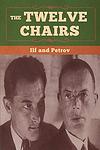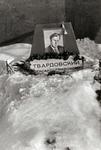The Greatest Soviet, Brazilian "Satire" Books of All Time
Click to learn how this list is calculated.
This list represents a comprehensive and trusted collection of the greatest books. Developed through a specialized algorithm, it brings together 305 'best of' book lists to form a definitive guide to the world's most acclaimed books. For those interested in how these books are chosen, additional details can be found on the rankings page.
Genres
Satire is a genre of literature that uses humor, irony, and exaggeration to criticize and ridicule human vices, follies, and shortcomings. It is a form of social commentary that aims to expose the flaws and absurdities of society, politics, and culture. Satirical books often employ sarcasm, wit, and parody to challenge the status quo and provoke thought and reflection in readers. Satire can be both entertaining and thought-provoking, and it has been used throughout history as a powerful tool for social and political critique.
Countries
Date Range
Reading Statistics
Click the button below to see how many of these books you've read!
Download
If you're interested in downloading this list as a CSV file for use in a spreadsheet application, you can easily do so by clicking the button below. Please note that to ensure a manageable file size and faster download, the CSV will include details for only the first 500 books.
Download-
1. The Posthumous Memoirs of Bras Cubas by Machado de Assis
The novel is a unique and satirical work, narrated by a dead man, Bras Cubas, who recounts his life from beyond the grave. The story is filled with ironic humor and philosophical musings as Bras Cubas explores his past, his relationships, and the societal norms of his time. The narrative breaks conventional storytelling norms, often addressing the reader directly and jumping through time without warning. Themes of love, wealth, power, and the human condition are explored, providing a critique of 19th-century Brazilian society.
The 590th Greatest Book of All Time -
2. The Twelve Chairs by Ilya Ilf, Evgeniy Petrov
In this satirical novel, a former nobleman and a con artist form an unlikely partnership in pursuit of hidden treasure. After the Russian Revolution, fortunes are overturned, and the nobleman learns that his family jewels were sewn into one of the twelve chairs from a dining room set. As the chairs have been scattered by the new Soviet regime, the duo embarks on a wild chase across the USSR, encountering a colorful cast of characters and navigating the absurdities of the communist system. Their quest for wealth is a humorous reflection on human greed and the ironies of fate in a society undergoing radical change.
The 1758th Greatest Book of All Time -
3. The Little Golden Calf by Evgeniy Petrov, Ilya Ilf
The book is a satirical novel that follows the adventures of a charming con artist in the Soviet Union during the 1920s. The protagonist, with a combination of wit, luck, and audacity, navigates through the absurdities of the Soviet bureaucracy and the remnants of the pre-revolutionary elite in pursuit of a mythical treasure. His journey is marked by a series of humorous episodes that expose the contradictions and ironies of the early Soviet society, ultimately offering a sharp critique of human greed and the folly of the era's political and social systems.
The 1788th Greatest Book of All Time -
4. Macunaíma by Mario de Andrade
This book is a hallmark of Brazilian literature, blending folklore, social critique, and surrealism to narrate the adventures of its eponymous hero, a shapeshifting character of indigenous origin who embarks on a journey from the Amazon rainforest to the city of São Paulo. Throughout his quest to retrieve a magical amulet stolen by a fearsome giant, the protagonist encounters a myriad of mythical creatures, gods, and figures from Brazilian folklore, all while satirizing the cultural and social issues of early 20th-century Brazil. The narrative is celebrated for its inventive language, playful use of Brazilian vernacular, and its pivotal role in the Brazilian Modernist movement, offering a unique exploration of national identity, racial diversity, and the complex relationship between tradition and modernity.
The 1856th Greatest Book of All Time -
5. Tent of Miracles by Jorge Amado
"Tent of Miracles" is a satirical novel that explores the themes of racism, colonialism, and the power of knowledge. The story revolves around the life of a poor, mixed-race Bahian scholar who is unrecognized in his own land but becomes a posthumous celebrity when a Nobel laureate praises his work. This sudden fame brings attention to his writings and his message against racial discrimination, and the book also portrays the vibrant culture and diversity of Bahia, Brazil.
The 2454th Greatest Book of All Time -
6. Vasili Tyorkin by Alexander Tvardovsky
The book is a classic Soviet-era narrative poem that follows the eponymous character, an everyman soldier, through his experiences on the Eastern Front of World War II. With a blend of humor, pathos, and folk wisdom, the protagonist embodies the resilience and resourcefulness of the Soviet people during the war. Through a series of episodic adventures, the poem paints a vivid picture of life on the front lines, capturing the camaraderie among soldiers, the hardships of battle, and the indomitable spirit of the protagonist as he navigates the brutal realities of war with wit and cunning.
The 3740th Greatest Book of All Time -
7. Sandro From Chegem by Fazil Iskander
The book is a satirical novel that follows the life and adventures of Sandro, a charismatic and larger-than-life character from the Abkhazian village of Chegem. Through a series of humorous and poignant anecdotes, the narrative explores the cultural and social dynamics of Soviet life, delving into themes of power, tradition, and the absurdity of bureaucratic systems. Sandro's escapades, which often challenge the status quo, offer a window into the complexities of life in the Caucasus region, blending folklore with political commentary and providing a rich tapestry of human experience that celebrates the resilience of the human spirit in the face of oppression and change.
The 3741st Greatest Book of All Time
Reading Statistics
Click the button below to see how many of these books you've read!
Download
If you're interested in downloading this list as a CSV file for use in a spreadsheet application, you can easily do so by clicking the button below. Please note that to ensure a manageable file size and faster download, the CSV will include details for only the first 500 books.
Download





